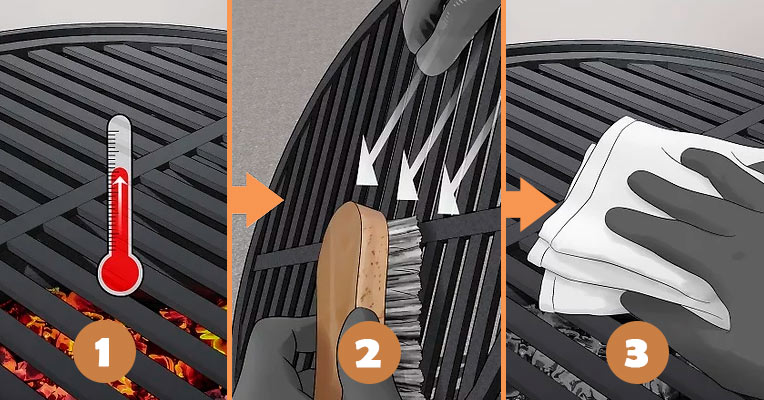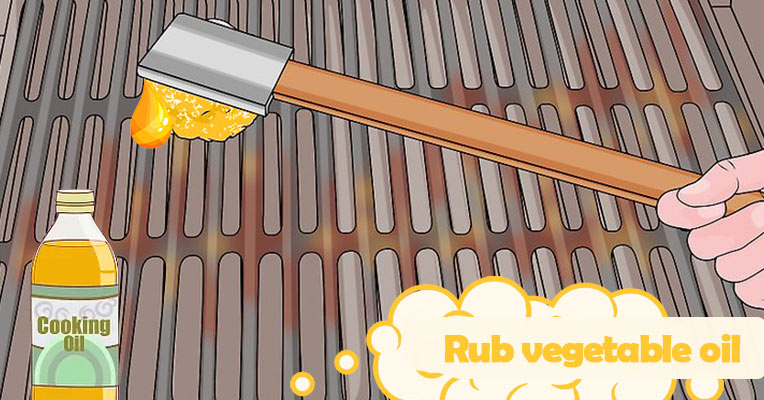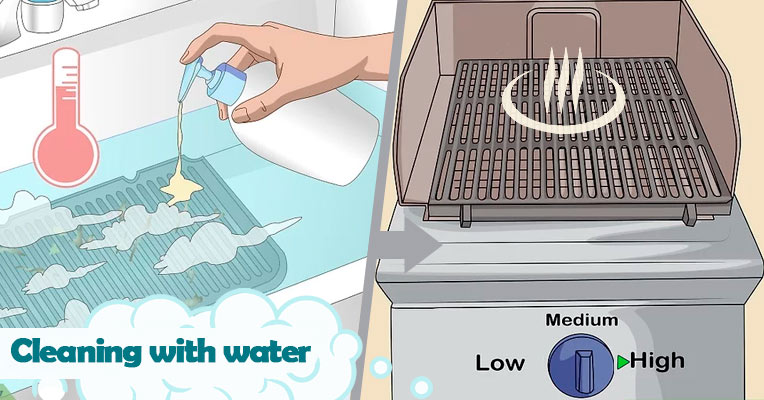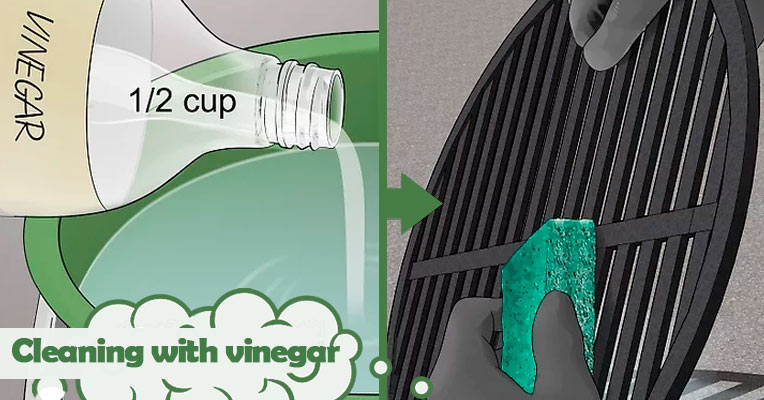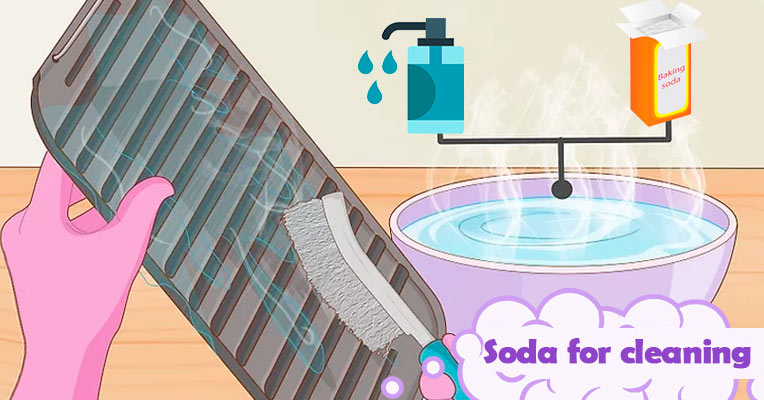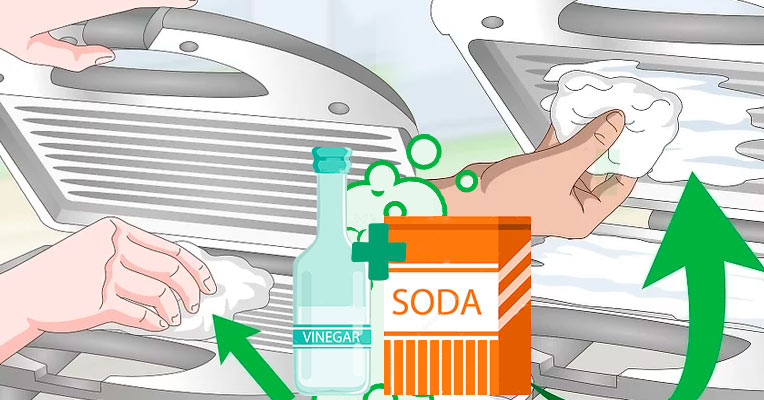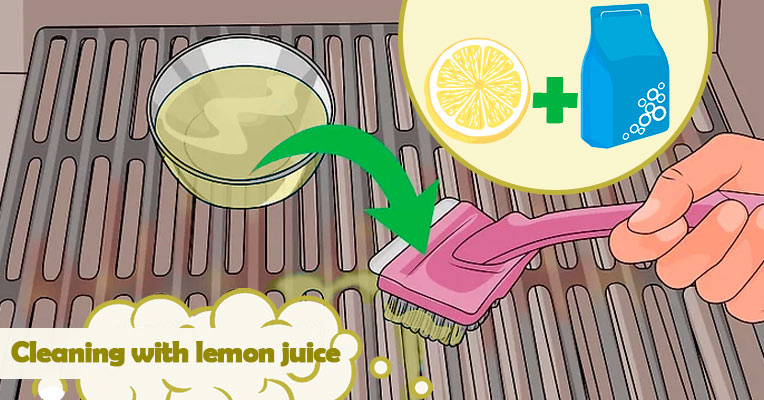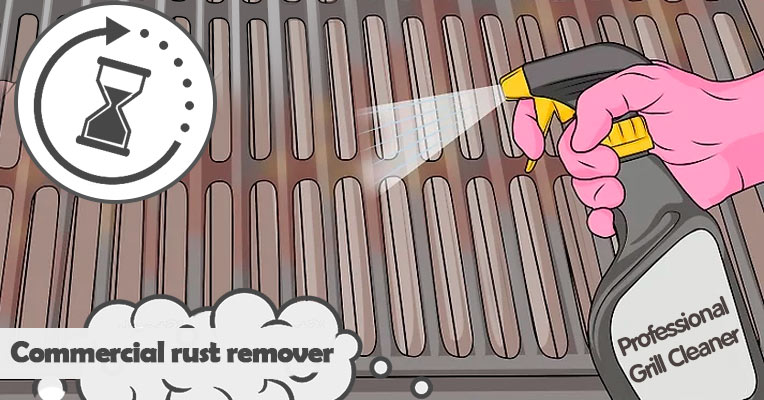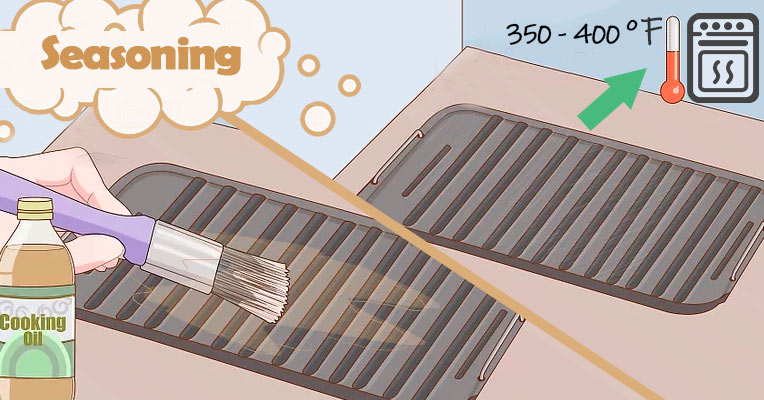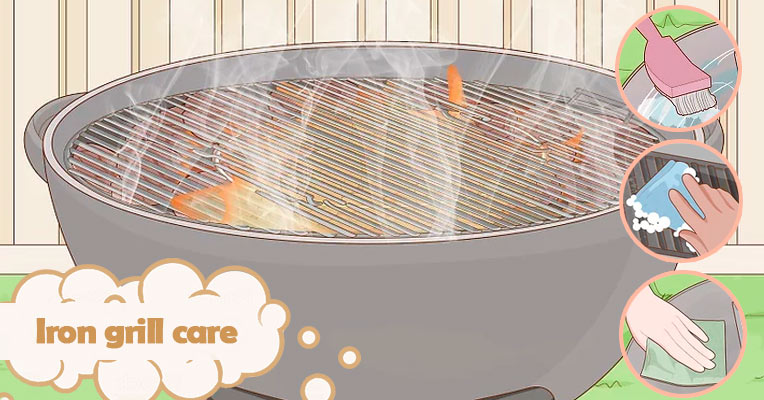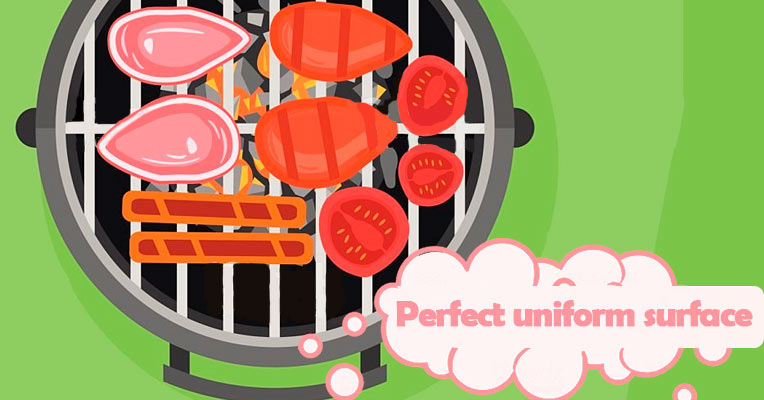Of course, it is best to keep your grill grate clean and wash it right after cooking. The longer you wait to clean it, the more difficult it will be to get all the burned food and sauce off the grate. So do not let it get too far and clean the grill right away. Start by heating up your grill to maximum temperature and burning off any particles of food left. Then let it cool down a bit and scrape your grate with a brush. It is important to use high-quality grill brushes in order not to damage the surface of your grill. After you’ve removed the remains of food, wipe the grate with a wet cloth, dry it thoroughly, and apply a thin layer of vegetable oil. That’s it! This will prevent rust from forming and keep your grilling equipment in good shape.
However, if your grates have already become rusty, these few steps will not do. So if you have let your grill get somewhat dirtier than you should have, here are the best ways to clean a cast-iron grill grate.
This is the easiest and most gentle method you can use. It will be effective in case of moderate rust. Dab a paper towel in any vegetable oil you have on hand. With quick, energetic movements, rub the rusty parts of the grate until the rust clears. It may take some time and effort, but it really works!
If the oil did not work, you may try soaking your grill grate in hot soapy water and using a soft brush to clean it. If you do not have a large enough place to soak the grate, just skip the soaking and wash it with hot soapy water. After that, you will need to dry it thoroughly; the safest way to do that is to stick it in the oven at a low temperature and leave it there for a few minutes. You can also put it back into the grill and dry it there.
Another great way is a vinegar soak. Make a 1:1 mixture of warm water and white vinegar and leave your grate in it for an hour, or two if you have the time. Then, wash it with warm water and a soft brush if necessary. Finish by drying the grate in the oven on low heat. Again, make sure it is completely dry when you put it back in storage. If you leave a cast-iron grate wet for as little as overnight, you may end up with even more rust than you started with.
This kind of cleaning will be good for any kind of food stains and rust. You may repeat the procedure several times until you reach the desired result.
There are two ways you can apply baking soda to clean your grill grate. For the first one, you need to mix warm water, baking soda and dish soap, soak the grate in this solution, then scrape it with a grill brush, rinse, and dry. The second option includes making a thick paste using water and baking soda, applying it to the rust build-up, and letting it sit for a few hours. Then, scrub away the paste together with the rust. You can choose either or both methods and see which one is more effective in your case.
If you want to make an even more powerful solution, mix white vinegar and baking soda to form a paste. Apply the paste to rusty spots and wait for 30 minutes. You may leave the paste on for longer if you have the time. After that, rinse the grate with water and dry it, preferably in the oven or grill.
If you have a bit more time, you can use a lemon juice solution to clean your barbeque grill. Mix lemon juice and powder detergent to make a paste and rub it on the rusty spots. Let it sit overnight. Then, rinse with warm water and dry thoroughly.
If all else fails, you may need to resort to a commercial rust remover. Make sure to choose a product made specifically for cast-iron grill grates. Also, check to see that the solution does not contain toxic chemicals because they may end up in your food later. What you need to do is apply the rust remover to any rusty parts of your cast iron bbq grill grate, let it sit for a few hours, then rinse and dry.
There is also another, more complex way to use a commercial rust remover. You will need the following items:
- Rust cleaner
- Safety gloves
- Garbage bags
With the safety gloves on, spray the rust remover on the damaged areas of your grate. Then, pack the grate in garbage bags, seal them tightly, and leave it in a warm place for a few days. However, you should check the manufacturer’s instructions and restrictions before you proceed with the commercial rust remover.
These are the best ways to clean your cast-iron barbeque grill grate. They may work better or worse depending on how much rust there is and how long it has been there, so you may need to try different approaches.
It is always best to be proactive when it comes to rust on cast-iron surfaces and make sure you take measures to prevent it. You can easily do that by seasoning your grill grate after each use and cleaning.
Seasoning is the process of applying vegetable oil to your cast-iron item and heating it on high temperatures. As a result, the oil polymerizes and creates a strong coating that makes the product non-stick with time and prevents rust from forming.
To season your cast-iron grill grate, you need to take the following steps:
- Wash the grate. Rinse the grate in warm water without using soap. Then, dry it off using a washcloth or a paper towel.
- Oil the surface. Dab a cloth or a paper towel in a cooking oil of your choice and rub it all over your cast-iron grill grate.
- Heat it up. Put the oiled grate into a preheated oven or into a hot grill. The temperature should be around 350-400 °F. Leave the grate there for about 1 hour, then turn off the oven or grill, and allow the grate to cool down.
This will be enough after a light, routine cleaning. However, if you have just bought your cast-iron grill grate or have cleaned it very thoroughly with abrasive materials, detergents, etc, then it will be best to repeat the process a few times to form several layers of oil around the material. It is a good idea to reseason your cast-iron grill grate once in a while and keep it dry and oiled at all times.
If you season your cast-iron grill grate regularly, you will notice that its non-stick properties are improving, and that it looks as good as new, no matter for how many years you have been using it.
Cleaning and seasoning are the two most important aspects of grill maintenance, but there are also other essential things you should remember about cast-iron grill grates.
- It is completely normal for the food to stick to the grate when you use it for the first couple of times. As you continue to cook on your grill, the oil coating will become thicker, and your food will no longer stick to the surface.
- Keep your grill covered when you do not use it to prevent the elements from damaging the cast-iron surface. If possible, move it indoors when you know you will not be using it for a while.
- Never put a hot grill grate in cold water—it may crack due to temperature shock.
- Use a paper towel or a natural bristle brush to apply oil to your cast-iron grate. Avoid synthetic or nylon brushes as they will melt when in contact with hot grates. Not only will you ruin the brush, but also the grate will be damaged as small particles of the brush will get stuck to the metal.
- Change grill brushes at least once a year.
- Use sauces and marinades moderately. When you use too much sauce or add it too early into the grilling, it will turn into a hard sticky mess on your grate.
- Never use a dishwasher for cleaning cast iron grill grate as doing so will create a coat of oil on the insides of your dishwasher, and it will be impossible to clean it out.
So if you are a proud owner of a cast iron bbq grill, you have to make sure you take good care of it. In case you are still deciding which grill would be best for you, check out this outdoor camping grills review—it will help you make your choice.
It may seem like owning a cast-iron grill grate is too much work: with all the cleaning, seasoning, precautions against abrasives and chemicals. But have no doubt: after you use cast iron once, you will not want to go back to any other material. It creates the perfect, evenly hot surface for your food and produces beautiful grill marks that will not leave anyone indifferent. Plus, if you use our advice on cleaning cast iron grill grate and its routine maintenance, it will serve you for life and will probably be passed on to your children.
